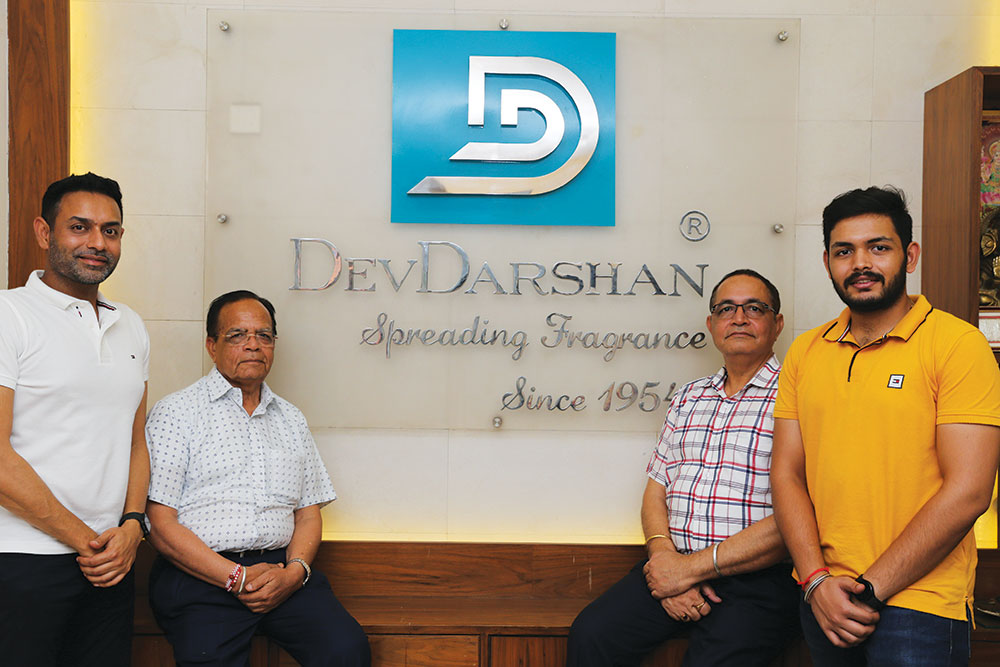
03 Jul DevDarshan, from Samana (Punjab) to a global brand
-Established in 1954
-Counterfeit, local products and fulfilling the needs of an aware consumer are challenges of the industry : Chairman B.L. Jain
After the country got independence, there was lack employment and business opportunities. During those days more than 80 percent of the population was dependent on agriculture along few jobs in the cities. The, then Prime Minister Pandit Jawaharlal Nehru appealed to the citizens to establish small, domestic, medium and large industries in various sectors. This was to increase and develop self-reliance and production to further create new employment opportunities. PM Nehru’s appeal led to the establishment of what we see today as big and successful industries throughout the country. Various companies like Hero Cycles, Liberty Shoes, MDH spices, Nirma washing powder came into existence and all of them had one thing in common, they were all from middle class families.
Similarly, in 1954, in Samana, 20 km from Patiala, Punjab, a company set its foot in dhoop and agarbatti industry. It was DevDarshan. All these entrepreneurs had a thing in common, their honesty, principles and hard work. Today their products and companies are number one in the country as well as abroad.The list also includes India’s No.1 DevDarshan, dhoop, agarbatti and other products. Even today none can match the quality of DevDarshan Dhoop
The founders aimed to establish DevDarshan in India on the basis of its high quality. Today it has become a global brand. Mr. B.L. Jain, the third generation of DevDarshan, in an exclusive conversation with ‘Sugandh India’ talks candidly about the history, challenges and success of their family business. The highlights are as follows-

Devdarshan is active in Dhoop and Agarbatti industry since past 70 years. It was started together by our grandfather and father in 1954 in Samana, a town in Punjab. This was a time when people did not have much understanding about business. Pandit Nehru had said that people should set up new industries, this will lead to development of the country and increase employment for the people. Taking inspiration from him, our grandfather started manufacturing dhoop from home. Everyone in the house used to make it together and sell it to the shops either on foot or on bicyle. After that my father got into business. He would also sell a dozen dhoop and incense sticks throughout the country and local shops. At that time the shops were few and the demand was also low. So the profit was barely there, but my father had an urge to establish DevDarshan as a global brand. He continued to insist on better quality and worked hard to set up the business in the small town. Today by the grace of the God, the hard work of the elders and through his blessings, Devdarshan is one of the top brands in the industry countrywide as well as abroad.
In response to the question regarding DevDarshan’s market and network across states?, Mr. B. L. Jain said that DevDarshan is supplied across Punjab, Haryana, Delhi, Himachal, Rajasthan, Jammu & Kashmir, Uttar Pradesh, Gujarat, Maharashtra, Bihar, West Bengal, Assam, Karnataka, Andhra Pradesh, Tamil Nadu, Orissa Telangana and almost everywhere in the country. A strong network of about 700 big and small distributors, more than 300 sales executives, assistant general managers, ZSM, RSM, ASM, T.M., TI, TO. The whole team is managed by vice president (sales) Mr. S. K. Ganju. in a systematic manner.
DevDarshan is a pioneer brand today and no one can match it, It is due to the principles laid down by our forefathers and the hard work of the employees and the love that DevDarshan gets from the people.
On the awards received for being a pioneer brand, he said that there are many manufacturers of incense sticks in the country, but no one could compete with our products and because of our quality in 1983 we received Gold Medal, ‘Udyog Patra’, award from the then President of India, Shri R Venkataraman. Other than this we have received countless awards till now. Another achievement for us is that Film actor Pran loved our products. The level of popularity is that there was a Mr. Pai living in Bangalore. On his visit to Shimla, he fell in love with the aroma of DevDarshan dhoop that the the taxi driver was using. He liked its aroma so much that he came straight from the airport to our office and bought it from us. In 1984, as the terrorism took over Punjab, we decided to shift to Chandigarh from Samana.
The production is carried out through different units in Mohali and Chandigarh. From here we supply across the country. We also have a depot in Andhra Pradesh from where we supply to South Indian states.
When asked about how the company deals with the competition in the market, he said that it the competition is too much, but we are not afraid of it, rather it should be healthy. As a pioneer company, we rely on our employees to handle it. Even in the age of machines, we have a employees comprising both male and female as per our requirement. We respect our staff a lot and provide them with good wage and various facilities like health care. We also provided them with full food aid during the Corona crisis, as we treat them as assets. Today dhoop and agarbatti industry has manufacturers in every nook and corner, but they do not provide quality. This is how DevDarshan remains ahead of everyone.
Against a question regarding counterfeit products as a major problem, Mr. Jain said that imitations never last, but they definitely harm the brand. He says that when he went to the court in a case of duplication, the judge shook off the duplicator and said that if you had put the hard work in the right direction instead of copying them, you could have created your own brand. Now you are back to where you started. Why do you chose to produce counterfeit products?
To prevent counterfeit products, the laws which are there should be strictly enforced by the government. As per the law, you cannot touch anyone while walking on the road. Similarly, no one should be able have a name similar to an established product and its brand. People keep on keeping all sort of similar names. The company has to file cases and thus more than 100 litigation files have been created, which are of similar name. The Registrar of Trademarks should not allow products with similar names, so that counterfeit products cannot enter the market. Judgments have also been made in hundreds of such cases, but the law is not strictly enforced. Another similar case if of similar packaging. Even on this, the company has to be careful, use holograms but still the local brands copy. The shop keepers and retailers earn a higher profit through these.
Responding to a question regarding product portfolio, he said that the DevDarshan has around 450 products. They have recently produced ‘Chandan teeka’. Apart from this, Roli, Camphor, Kalava, itr, Puja Jyoti, Ghee diya, packaged Ganga water from Gangotri and ghee wicks made from cow’s ghee have also been rolled out as pooja items. He told that other than India, DevDarshan’s products are exported to various countries like UK, US, Germany, Arab countries, Canada, Australia etc. Nowadays, foreigners have developed interest towards yoga, so they use fragrant incense sticks during Yoga and meditation. Oud is widely preferred Arab countries and lavender and frloral aromas are in great demand in other countries. Apart from the traditional floral fragrances, a alot of new fruity aromas are also being preferred.
On how he is doing business in this era of inflation, he said that the company is following the principles laid down by its ancestors that even if there is no profit, the quality will not fall. Today we are majorly working without profit. Keeping an eye on the future. Against the question, whether people are ready to pay more for quality? He said that between the consumer and the manufacturers, there are shopkeepers and distributors. Distributors and shopkeepers dislike if their profit margins come down. Therefore, we appeal to the shopkeepers also that they should change their policy, otherwise online stores like Amazon and online marketing companies will eliminate the retailers. They should adapt to do business at a slightly lesser profit margin.
Government should also bring local brands under GST: Pradeep Jain
Pradeep Kumar Jain, younger brother of Mr.B. L. Jain, who plays a major role in DevDarshan Dhoop-Agarbatti business, while joining the conversation told ‘Sugandh India’ that nowadays youth are demanding new trends in the field of fragrance. The biggest challenge before the industry is local products. Big brands have to incur raw material costs for quality. Huge sales staff, dealers, whole sellers have to be kept. Taxes have to be paid. Employees have to be paid salaries, allowances, health care. This increases the cost and expenses, while the local producers have no such responsibility. Neither the salary of the employees and taxes nor the quality raw materials. They just buy whatever raw incense sticks that are available, put them in whichever cheap readymade perfume and sell them personally. The is a serious issue as how do big brands compete with them?
In response to a question, he said that the big shops do not keep local brands but various small shops do. If we give any of our products for Rs 100, the shopkeeper makes a profit of Rs 10-20, but local brands provide them products for for Rs 60 or 70. The shopkeeper then sells it for Rs 100 and makes a greater profit of Rs 40. The consumer is the one who ultimately gets affected by paying a higher price for a substandard product. Nowadays production is being carried out in every nook and corner of the city. Raw material can be ordered online. Reputed brands have to buy costly raw materials to maintain the quality. They also have a responsibility to provide health wise safe products. All of this increases the cost a lot.
In response to how this can be stopped, he said that it can be stopped if the government registers all the manufacturers in GST. There is currently no mechanism to check quality, but after coming under GST, they will not be able to provide substandard products. The government should make a law to stop this. Also it also affects government revenues as they do not pay any kind of tax.




No Comments